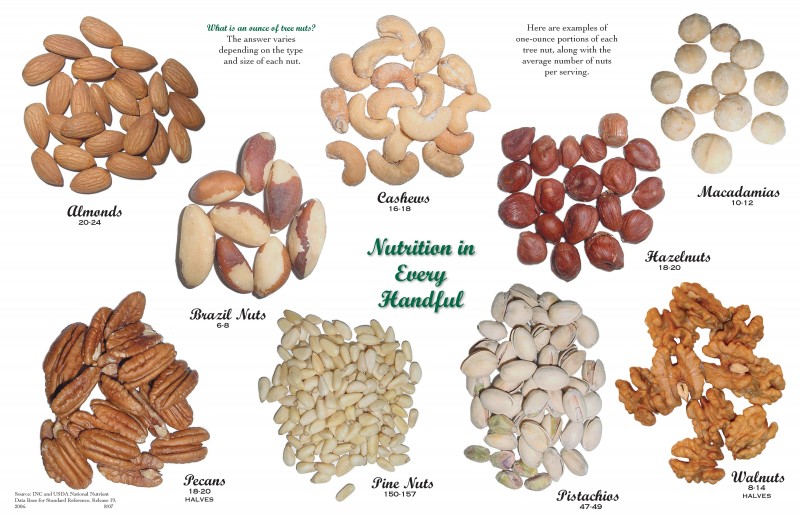Guest post by Jenny Babino, RD, LD, courtesy Maine Academy of Nutrition and Dietetics
Nuts and peanuts, the new health food?
In a large, international study published in the Journal of the American Medical Association, researchers from Dana-Farber Cancer Institute, Brigham and Women’s Hospital and the Harvard School of Public Health, found that eating nuts and peanuts (a legume, not actually a nut) can help decrease your chances of premature death.
People who ate a handful of nuts every day were 20% less likely to die within a 30-year period compared to individuals who did not eat nuts. The study also found a 29% reduction in deaths from heart disease with regular nut consumption — important since heart disease continues to be the number one cause of death for both men and women in the US.
Other nut benefits
Additional health benefits of eating nuts include a decreased risk for developing diabetes, respiratory illnesses, and gallstones, which have been documented through previous research studies.
Nuts are nutrient-dense. They contain many vital nutrients that are beneficial to our health, including protein, fiber and minerals.
Nut consumption has been shown to help regulate blood pressure levels. They also promote satiety. In other words, they fill you up!
So if you’ve been avoiding nuts for health reasons, you just might want to reconsider — there’s a lot to like about these little nuggets of nutrition!
What about their fat content?
It’s true, nuts contain quite a bit of fat. However, the fat in nuts is primarily what is generally referred to as “good fat.” These are the monounsaturated and polyunsaturated fats that have been shown to lower overall blood cholesterol levels, and specifically decrease dangerous LDL cholesterol (the kind that increases heart disease risk) and increase HDL cholesterol (the “good” kind that lowers risk of heart disease).
Nuts also contain vitamin E, which may help prevent plaque formation in the arteries, and many nuts also contain heart-healthy omega-3 fatty acids.
A high-fat content means that nuts are also high in calories — 130+ calories per ounce. Interestingly, research has found that people who eat nuts regularly have been found to weigh less and are less likely to gain weight compared to those who don’t consume nuts on a regular basis.
The bottom line: keep your portions of nuts in check if you’re watching your weight. Check out this poster for an idea of how many nuts there are in one ounce (or about a handful.)
How to get a little nutty…
- Spread a little nut butter on whole-grain toast, sliced pears or apples
- Sprinkle chopped nuts over your salad, yogurt or cereal
- Add nuts to stir-fries or scatter a few over-cooked veggies
- Make homemade trail mix with nuts and dried fruit of your choice
NutHealth.org has more great suggestions.
- Do what the French and Italians do — pair asparagus with hazelnuts and almonds. It’s also delicious with pecans, pistachios and walnuts.
- Try adding a crumble of goat cheese and some roasted nuts. For a main dish, add asparagus to pasta or risotto along with some roughly chopped nuts, basil, lemon and olive oil.
- Love artichoke dip? Add some pistachios, almonds, lemon and herbs to the mix.
- Make a warm salad of steamed garden peas and fava beans with mint, a squeeze of lemon and crumbled cashews, macadamias and hazelnuts.
- How about some plump baby beets served with crumbled walnut or pecans and a dollop of Greek yogurt?
- Maybe you have some rhubarb growing in the backyard. Dice and sauté the stalks with walnuts and spread over grilled chicken breast.
Share your nutty ideas!
If you have some healthy nutty suggestions, by all means, share them with us!




Leave A Comment